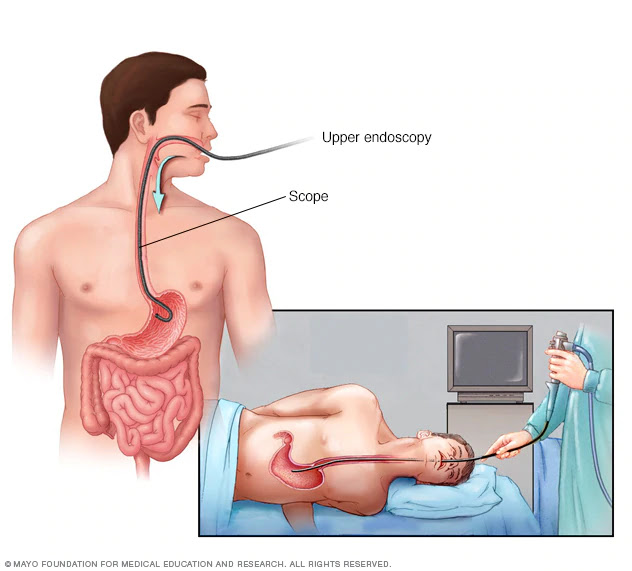Risk factors And The Treatment Option for Gastritis
Risk factors for gastritis
Several things can make you affected by this condition. Risk factors for gastritis are:
- Frequently eat spicy foods or foods with high-fat content.
- Unhealthy lifestyles such as smoking or drinking alcohol
- Overweight or obese
- Stress or fatigue
- Irregular eating patterns
- Frequently taking painkillers
- Other complications caused by infection: HIV / AIDS, Crohn's disease, and other bacterial infectious diseases
- It has food allergies, especially for people who have eosinophilic esophagitis (EoE, indigestion). This condition can be a trigger for gastritis. It is important to consult a doctor or allergist to detect food allergies to avoid gastritis.
What are the treatment options for gastritis?
 |
| Photo by mayoclinic.org |
Medication for acute and chronic gastritis usually uses antibiotic treatment, and drugs that are able to ward off acid can be taken for acute gastritis. It would be best to avoid alcohol and ibuprofen, naproxen, and aspirin while taking gastritis medication from a doctor.
Meanwhile, your doctor will recommend that you use the following acute and chronic gastritis medications to limit the amount of acid in your stomach:
Antihistamine-2 (H2) drugs: Famotidine, Cimetidine, Ranitidine, and Nizatidine
Proton blocking pumps (PPI): Omeprazole, Esomeprazole, Iansoprazole, Rabeprazole, and Pantoprazole.
Besides, you can also use intravenous fluids and medications that can reduce acid if your gastritis worsens.
Special diet for gastritis
You can apply certain food diets to prevent and treat gastritis. Several foods can help manage your gastritis and reduce symptoms. Foods that are good for gastritis are:
- You can choose foods with high fiber content such as apples, oatmeal, broccoli, carrots, and nuts.
- Low-fat foods such as fish and chicken breast and turkey breast without the skin.
- Foods with low acidity. It is recommended to eat boiled vegetables.
- Avoid soft drinks.
- Avoid caffeinated drinks like chocolate, coffee, tea.
- Increase the consumption of probiotics from kombucha, yogurt, kimchi,
The usual test for gastritis
Gastritis is a condition that is diagnosed based on the patient's symptom description. However, to ensure accuracy, doctors use the tests below:Endoscopy
The first test is through an endoscopic procedure by inserting a flexible tube with a lens (endoscope) through your throat. This tube will enter through the esophagus, stomach, and small intestine. With an endoscopic procedure, it can identify signs of inflammation in the stomach.
If a suspicious sign is found, your doctor may take a small tissue sample (biopsy) for laboratory tests.
H.pylori test.
The H. pylori test is a test that can be done in various ways, including blood tests, stool tests, or a breath test. You will be told to drink a small glass of clear and tasteless liquid containing radioactive carbon for the breath test.H. pylori bacteria will break down the test fluid in your stomach. Then, you exhale into a bag or a special office, which is then sealed. If you are infected with H. pylori, your breath sample will contain radioactive carbon.
Treatment at home
The lifestyle and home remedies below may be able to help you overcome the acute or chronic gastritis you are experiencing:- Eat a little but often
- Eat cooked dishes
- Wash your hands before eating to avoid infection
- Follow the doctor's directions, do not take drugs without a prescription or stop taking the medication without a doctor's permission
0 Response to "Risk factors And The Treatment Option for Gastritis"
Post a Comment